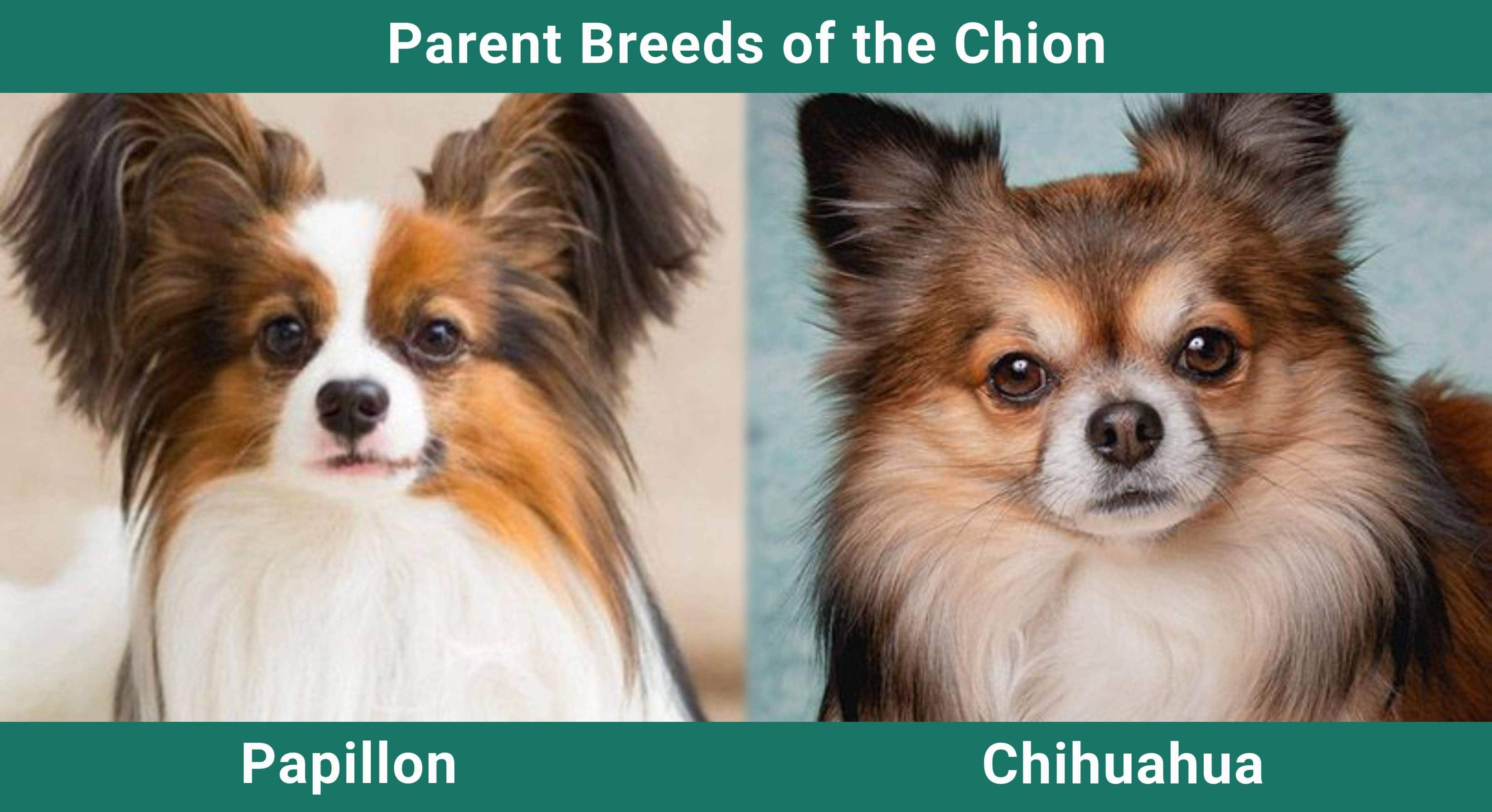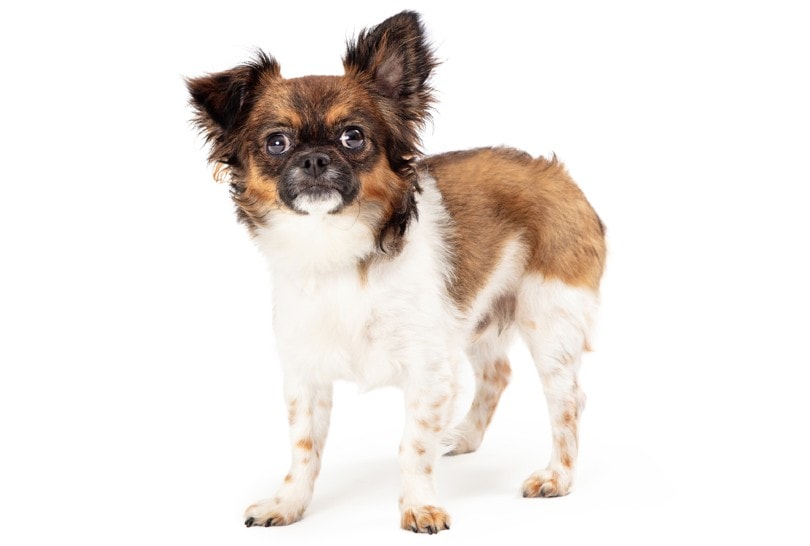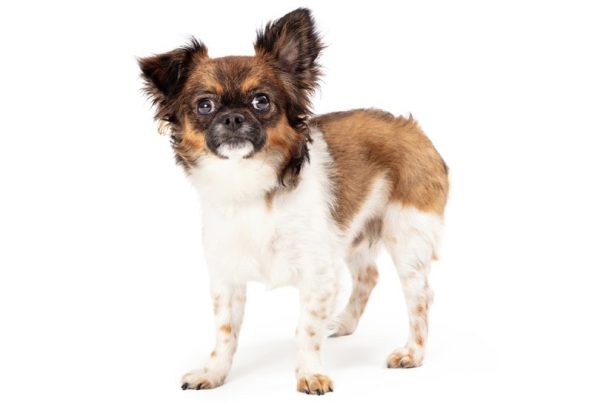Click Below to Skip Ahead
Wondering what a Chion is? Whether you’re a dog lover or not, it’s worth knowing about. The Chion or Pap-Chi is a mix of two popular breeds for their small and loving personalities: the Papillon and the Chihuahua. Both of these breeds are noted for their long ears that flop over. The Chion also has very similar characteristics, although it is larger than its parent breeds due to a longer lower jaw and legs.
Breed Overview
Height:
6 – 11 inches
Weight:
5 – 15 pounds
Lifespan:
12 – 14 years
Colors:
Black, brown, white, cream, fawn, chocolate, and golden
Suitable for:
Families with kids, apartment living
Temperament:
Social, courageous, loving, affectionate, gets along with other pets
If you own one of these dogs, this article will tell you everything you need to know about the breed. It will advise on training, diet, and other facets of the dog’s care needs. It will also let you know about the possible health issues to watch for, so you can spot when they occur and take care of them right away.
If you’re thinking of adopting one for the first time, read on to learn more about these cuddly little guys and how they can become your new best friend!
Chion Puppies
https://www.instagram.com/p/CQNvc0-jdPV/?utm_source=ig_web_copy_link
When you decide it’s time for a new addition to the family, there are a few costs you need to keep in mind. Obviously, you’ll have to factor in the price of a Chion itself. You’ll want to make sure that you pick one from a reputable breeder since many scams sell sick or deformed dogs for high prices.
Once you get your pup, you’ll need to take it to the vet for shots, tests, and more. Finally, it would be best if you readied your home for the arrival of a Chion. Get everything you need for your new pet, from food and water bowls to beds and toys, including grooming supplies, a cage, and maybe even dog insurance. You’ll also need a leash to take it on walks, and a carrier cage for the vet.

Temperament & Intelligence of the Chion
The Chion is a very loving, loyal breed that will bring joy to your home when you adopt one. It’s also smart and funny, even more so than many dogs with longer lifespans! They are easy to train if they’re younger – older dogs will have some trouble learning new tricks because of their age, but it still won’t be impossible.
Chions are extremely playful dogs that love to fetch balls or sticks for hours on end. You’ll find yourself becoming a much better athlete since you’ll get in shape chasing after these little guys whenever they run away from you!
They aren’t known as overly aggressive or territorial dogs, so you won’t need to worry about that breed trait. Even so, you must always supervise your dog when guests come over since all dogs can be unpredictable from time to time.
Finally, let’s mention their trademark clumsiness.
Because of their size and physical condition, Chions are prone to accidents in the house – they may trip on blankets or other objects that get in their way, leading to a serious injury. They also have very low-set tails, so be wary of that when they’re running around and chasing things in your home. It’s important to monitor their behavior and dogproof anything you may need to in your home.
Are These Dogs Good for Families?
Chions are great dogs for parents with small children. Because they’re so small and tend to be gentle around kids, these dogs can stay in the same room as your little ones without you having to worry about them getting hurt or causing damage.
They’re also good at sensing when a toddler is trying to pet them – since toddlers sometimes forget their own strength, this can be a very handy trait! If they’re scared of someone or something, it’s very easy to comfort them. When meeting with kids who don’t live in your household, supervise them at first, since both parties are unpredictable.
The only thing you should be aware of is that Chions respond poorly to teasing – since they’re so playful, it will seem like nothing more than fun and games, but your dog won’t necessarily consider it that way. Make sure to remain in control of the situation at all times!
Does This Breed Get Along with Other Pets?
The Chion and its relatives aren’t known for going to war with other pets, but that doesn’t mean they’ll handle living with them all that well. When you have a dog breed that was originally engineered to hunt vermin, you can guess how much it likes having other types of animals in the same room with it!
The trick is to be sure you adequately socialize your pet in its formative years. You should still supervise them as they interact with new animals, but you can expect the Chion to get along just fine generally. Chions might get jealous if you spend less time with them because of a new pet, so be sure never to neglect your buddy.
If the Chion has known the other pet since a puppy, there should be no problems.
Things to Know When Owning a Chion:
Chions are relatively low-maintenance dogs, but they still need a bare minimum of care to thrive and live happy lives. Here are a few things you should know about your daily life with this pet.
Food & Diet Requirements
Chions are small-sized dogs that can live well on a standard diet, but you should still take the time to think about what’s best for yours in particular.
Some Chion owners say their pets prefer dry food, while others swear up and down that wet food is better. Try mixing it up a bit to see what works best for your pet.
The general rule of thumb is that Chions should get at least 1 cup of food per day, and you should split it into two smaller meals to help ensure proper digestion.
Always keep water available to your pet at all times during the day. The cost of food for your Chion will depend on what brand of food you choose. Some are a lot more expensive than others, and it might be worth it to feed your Chion high-quality food if you want to prolong its life.
Exercise Requirement
Because of their size, all dogs require a certain amount of exercise each day. Although they are small, Chions are full of energy – giving them adequate exercise each day is essential for their physical health.
As long as they’re getting enough exercise, you don’t have to worry too much about the type of exercise. As mentioned above, these dogs are built to chase after anything that moves, so any type of running around will do. Aim for one or two 15-minute walks throughout the day to give your dog a sense of adventure.
You should always be careful when letting your pet run around the neighborhood – these dogs aren’t very strong, so an accident could happen at any time.
Physical exercise is also extremely important for your dog’s mental health. Some dogs can get depressed and lethargic when they don’t get enough playtime, while others become aggressive and act out by breaking and chewing on things to get your attention.
Training
Because of their lively and playful nature, Chions enjoy interacting with their owners.
Training is essential if you want your pet to listen to you and do what’s right at all times. To begin training your Chion, always be as positive as possible – using rewards and encouragement over scolding will teach your pet much more effectively than yelling at it.
If you plan to take your dog with you on walks through the neighborhood or out to public places, consider training it to walk politely on a leash. If you struggle with this type of training, there are tons of resources available online that can help get your pet walking in a well-mannered fashion!
Note that Chions are very intelligent and can be stubborn at times. Patience is key here – these dogs will learn quickly if you’re consistent with the training you provide.
Grooming ✂️
These dogs are not very high-maintenance from a grooming standpoint, so you won’t need to worry about that part of their life! Just make sure they’re always clean – wash them whenever they get dirty or have a bad smell – and remember to brush their teeth on a regular basis.
You should use professional grooming services every few months – this will help to keep your dog looking its best at all times. Chion coat types are susceptible to temperature changes! If you’re in a climate like Minnesota or Wisconsin, make sure these dogs stay warm during the cold months and cool during the summer.
Health and Conditions
Like most dog breeds, Chions can be affected by several different health issues throughout their lives. Remember to keep an eye out for these signs so that you can provide your pet with the care it needs.
- Allergies
- Cardiovascular Problems
- Hip Dysplasia
- Eye Issues
- Hearing Problems
Hip Dysplasia (Serious Condition): This issue, which stems from improper growth and development of the hip joint, is perhaps the most common health problem Chions deal with. It can be corrected through surgery if your pet becomes painful or immobile as a result of it.
Eye Issues (Serious Condition): Because these dogs have such unique eyes, they’re susceptible to a variety of different eye issues that can render them blind or lead to pain. As with any dog, you should take your pet to the vet immediately if there is redness in its eyes, tearing, the presence of discharge, etc.
Hearing Problems (Serious Condition): This issue occurs when an ear infection causes fluid buildup and affects your pet’s hearing. You can correct these problems through medication from your vet, but they can be dangerous if left untreated.
Allergies (Minor Condition): Although this is not a life-threatening condition, allergens in the air can cause your pet to develop rashes, inflammation of the ears, or skin infections. To prevent these issues, you should brush your pet’s coat daily and keep it clean.
Cardiovascular Problems (Minor Condition): Although most companion animals with cardiovascular issues are cats, Chions can be affected by this issue. If your pet is exercising regularly but still seems tired or out of breath at all times, consider taking it to the vet.
Sometimes, the best way to keep your Chion healthy is through preventative care. Your vet will be able to give you a schedule of vaccinations designed to keep sickness away from your pet – as long as you follow along with these vaccine times, you should have nothing to worry about!
Male vs Female
The main difference between male and female Chions is the testosterone exposure during gestation. Female puppies are exposed to high testosterone levels and therefore become more masculine, while male puppies are not exposed and therefore develop more feminine traits.
This means that female Chions are usually heavier than their male counterparts, are more muscular, tend to be larger overall, and have longer legs. They also do not have the same aggressive tendencies that male Chions display – in fact, female Chions tend to be much friendlier than their counterparts.
Male Chions can weigh anywhere from 6 to 12 pounds on average, while females can weigh anywhere from 8 to 16 pounds!
Female Chion’s eyes tend to be larger than their male counterparts, while males’ eyes are usually very close in size. finally, male Chions have more outward-facing ears; females tend to have folded-back ears or pointed inside (to provide protection from the sun).
3 Little-Known Facts About the Chion
1. Contrary to popular belief, the Chion is not a purebred dog.
It’s known as a designer breed, which means it was created by mixing two other breeds. This particular breed has been criticized since some believe it’s not ethical to mix species to get a desirable outcome, especially when the species don’t mix well.
Because of this, it was thought that the Chion wasn’t a healthy breed. However, since it was created in the late 1980s, breeders have been working hard to make sure they aren’t passing any issues onto their offspring.
So far, this hasn’t been something they’ve had to worry about – these dogs are as healthy as can be!
2. The Papillon was originally bred to hunt vermin, such as rats and weasels.
The origins of the Papillon trace back to France, which is why the name translates to mean “butterfly,” due to the appearance of its ears. A Papillon with his ears folded over to the left was likely ready for a hunt! Royalty and nobles mostly used them for hunting vermin and small rodents.
That’s not what they want to do in your home, but it does tell you something about their intensity and drive. If you’re looking for a laid-back pet that will relax at your feet all day long, this might not be the dog breed for you!
3. Chions are extremely rare dogs, and they’re not widely known to exist.
Even people who have been dog owners for a long time may not recognize this mix as its own breed, especially if it’s a smaller one that hasn’t reached maturity yet.
Its rarity makes it a highly desirable dog, so you should be prepared to compete with other people for your newest family addition; otherwise, you may have a hard time getting one!
Conclusion
If you’re looking for a new family member, the Chion is an excellent choice. It might be small in size, but it has plenty of character! This mix between Chihuahua and Papillon dogs is easy to care for. They are happy-go-lucky, playful, and intelligent creatures who love giving affectionate cuddles.
The perfect pet for any home or apartment, these little guys can fit anywhere as they are only about 8 inches tall on average (with some growing up to 10 inches). They’re pretty low maintenance, too – all they need is regular brushing with a soft brush and occasional bathing if necessary.
They do, however, require a certain amount of physical exercise every day due to their high energy levels. If this is something you can provide, the Chion might be the pet for you!
If you’re looking for another interesting pet idea, visit our blog to find articles on unusual breeds like this one!
We have lots more Chihuahua Mixes for you to enjoy!
Featured Image Credit: Susan Schmitz, Shutterstock









